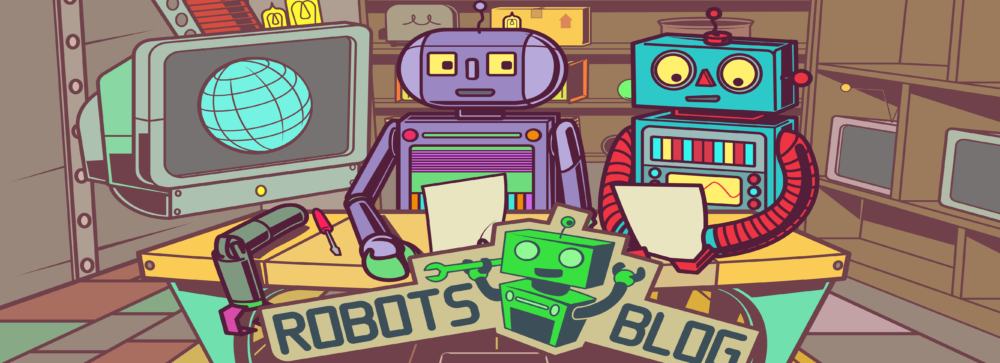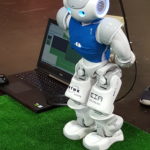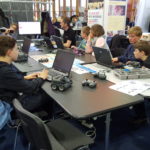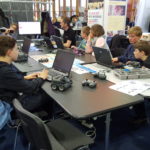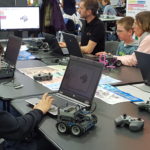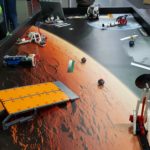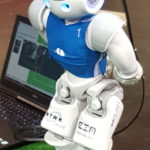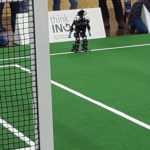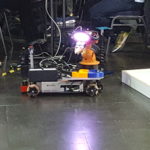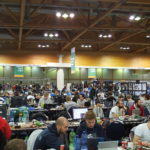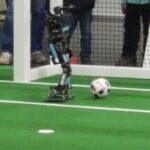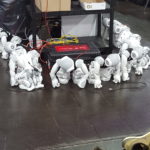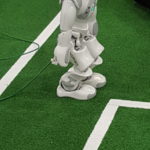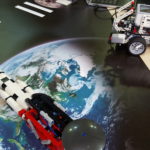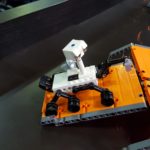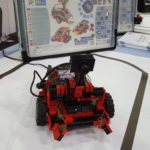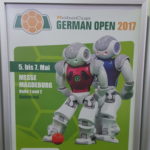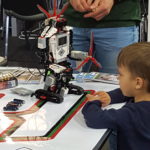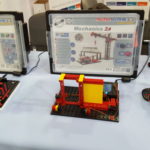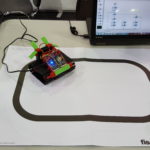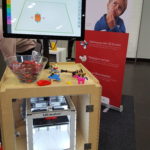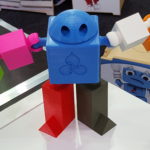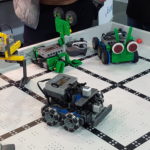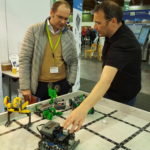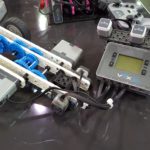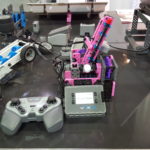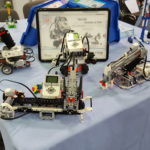Archiv der Kategorie: Events
Livestream: RoboCup German Open SPL – So, 7. Mai 2017 – live aus Magdeburg
RoboCup German Open, Standard Platform League
Sonntag, 7. Mai 2017 – LIVE aus Magdeburg
produziert vom StreamTeam der HTWK Leipzig
https://streamteam.htwk-leipzig.de
RoboCup German Open 2017, Day 2
Livestream: RoboCup German Open SPL – Sa, 6. Mai 2017 – live aus Magdeburg
RoboCup German Open, Standard Platform League
am Samstag, 6. Mai 2017 – LIVE aus Magdeburg
produziert vom StreamTeam der HTWK Leipzig
https://streamteam.htwk-leipzig.de
RoboCup German Open 2017, Day 1
Livestream: RoboCup German Open SPL – Fr, 5. Mai 2017 – live aus Magdeburg
produziert vom StreamTeam der HTWK Leipzig
https://streamteam.htwk-leipzig.de
Maker Faire Berlin präsentiert riesige Roboterhand
*„Hand of Man“ zerstört Autos mühelos*
„Hand of Man“ – Das Highlight auf der Maker Faire Berlin
*Hannover, 21. April 2017 – Eine acht Meter hohe und sieben Tonnen schwere Handskulptur aus Stahl ist die spektakuläre Attraktion auf der diesjährigen Maker Faire Berlin <https://maker-faire.de/berlin/> am 9. und 10. Juni in der Station am Gleisdreieck. Die hydraulisch betriebene Roboterhand kann Autos mühelos hochheben und in der Luft zerquetschen.*
Der 46-jährige amerikanische *Robotic-Künstler Christian Ristow* entwickelte mit einem kleinen Team innerhalb von vier Monaten die *hydraulisch angetriebene Hand-Skulptur „Hand of Man“*, die schon auf dem Burning Man Festival in Nevada für viel Applaus sorgte.
*„Mir hat es Spaß gemacht, etwas zu bauen, was jedermann intuitiv bewegen kann“,* sagt Ristow. Eine Besonderheit ist die Steuerung. Hierzu gibt es keine Hebel oder Knöpfe, sondern einen Handschuh. Dieser ermöglicht, dass die Bewegung der eigenen Hand von der Roboterhand nachgeahmt wird.
Auf dem bunten DIY-Festival Maker Faire in Berlin *können einige Besucherinnen und Besucher selbst die handschuhartige Steuerung ausprobieren* und mit den Fingern der überdimensionalen Hand ein altes Auto hochheben und zerstören.
Weitere Hingucker auf der Maker Faire Berlin sind erneut die kleinen *Star-Wars-Droiden R2D2*, die der r2-Builder-Club nachgebaut hat, sowie der *RoboCup*, bei dem Schüler und Studenten Nano-Roboter Fußball spielen lassen. Darüber hinaus gehören der selbstgebaute *Fotobus Cliff McLane*, in dem sich die Besucher als Crazy Maker verewigen können, sowie das *Lego-Auto*, das besonders die Kleinen zum Mitbauen einlädt, zu den Highlights.
*Tickets und weitere Informationen* zur Maker Faire gibt es auf der Website: https://maker-faire.de/berlin.
*Noch bis zum 30. April gelten besonders günstige Eintrittspreise. *
Bilderstrecke: http://bit.ly/2oR5SPY
MATLAB EXPO 2017 – Branchenübergreifende Konferenz zu Anwendungen mit MATLAB & Simulink
Aachen / München, 20. April 2017 – Am 27. Juni 2017 lädt MathWorks wieder zur MATLAB EXPO in München ein und bietet Experten aus Wirtschaft, Forschung, Industrie und Hochschullehre ein Forum zum Austausch über konkrete Anwendungsbeispiele und Lösungen mit MATLAB und Simulink. Dabei deckt die größte MATLAB & Simulink-Konferenz Anwendungsbereiche von der Automobilbranche über den Maschinenbau bis hin zur Medizintechnik aus nahezu allen Industrien ab und demonstriert darüber hinaus den Einsatz der Produkte in Forschung und Lehre. So haben Anwender die Möglichkeit, über Branchen hinweg Kontakte zu knüpfen, Ideen auszutauschen und sich über Neuerungen der MATLAB- und Simulink-Produktfamilien zu informieren.
Vortragsprogramm und Fachausstellung.
In diesem Jahr stehen vor allem Themen wie Autonome Systeme, Machine Learning, Modellbasierte Entwicklung oder die Modellierung von Maschinen und Anlagen im Vordergrund. Die mehr als 700 Teilnehmer erwartet ein Konferenzprogramm mit 46 Vorträgen in vier parallelen Tracks. Unternehmen wie Bosch, BMW, Volkswagen, Siemens, Infineon oder Trumpf sowie Universitäten aus Deutschland und Österreich sowie Forschungsinstitute berichten über den erfolgreichen Einsatz von MATLAB und Simulink. Auch die begleitende Fachausstellung mit 25 Demo-Points von MathWorks und Partnerunternehmen bietet Experten, Ingenieuren und Managern die Gelegenheit zum persönlichen Austausch und Networking. Darüber hinaus werden Projekte aus dem akademischen Umfeld in einer eigenen Poster-Ausstellung präsentiert.
Keynote Sprecher
Zur Einführung spricht Michelle Hirsch, Head of MATLAB Product Management bei MathWorks, darüber, wie die Technologie autonomer Systeme nicht nur unsere Produkte, sondern auch die Geschäftswelt verändert. In ihrem Vortrag „How to build an Autonomous Anything“ geht sie auf die Voraussetzungen für autonome Systeme – also Systeme mit der Fähigkeit, selbstständiges Handeln erlernen zu können – ein und erläutert, wie Wissenschaftler und Ingenieure diese Elemente zur Entwicklung ihrer autonomen Systeme kombinieren.
Im Anschluss widmet sich Prof. Dr. Sami Haddadin, Direktor des Instituts für Regelungstechnik der Leibniz Universität Hannover, dem Thema „Robots and Humans in the Digital World“. Robotern die direkte physische Interaktion mit dem Menschen zu ermöglichen, war jahrzehntelang eines der primären Ziele der Roboterforschung. In seinem Vortrag wird Prof. Haddadin darstellen, wie die menschzentrierte Roboterentwicklung, -kontrolle und -planung vernetzte Roboter in naher Zukunft für unsere Gesellschaft zu einem Gebrauchsgut machen, und inwieweit die ersten kommerziell verfügbaren, vernetzten Systeme in der Lage sind, zu interagieren.
In seinem Vortrag „Vom Halter-Bieger zum Bit-Schubser“ – Die digitale Herausforderung eines Truck OEM auf dem Weg zum autonomen Fahren“ erläutert Stefan Teuchert, Vice President Electric/Electronic Systems Vehicle Functions, MAN Truck & Bus AG, welchen Einfluss die Trends der Digitalisierung auf das Truck Business haben. Während die Mechanik bisher im Vordergrund des Unternehmens stand, entwickeln sich die Elektronik und Software derzeit zur differenzierenden Disziplin des Unternehmens. Herr Teuchert zeigt, mit welchen Methoden, Tools und Prozessen in einer Hightech-Software-Entwicklung gearbeitet wird und welche Faktoren für den Erfolg ausschlaggebend sind.
Auszug aus dem Konferenzprogramm:
Simulationsbasierte Entwicklung von ADAS und automatisiertem Fahren mittels Machine-Learning
Dr. Andreas Kuhn, Andata
Modellbasierte Entwicklung von Regelungsalgorithmen für Abkantpressen
Dr. Martin Bruckner, Trumpf Austria
Klassifizierung von individuellem Fahrverhalten
Julia Fumbarev, Volkswagen
IRT-Buggy – eine Plattform für autonome Navigation für Forschung und Lehre
Andreas Trzuskowsky, RWTH Aachen
Solar Impulse: Erste erfolgreiche Weltumrundung mit einem Solarflugzeug
Ralph Paul, Solar Impulse
Modellbasierte Systementwicklung für Smarte Sensoren
Dr. Benjamin Schwabe, Infineon
Detaillierte Informationen zur Konferenz finden Sie im Internet unter www.matlabexpo.de.
Make Munich – Das Maker- und Do-It-Yourself Festival
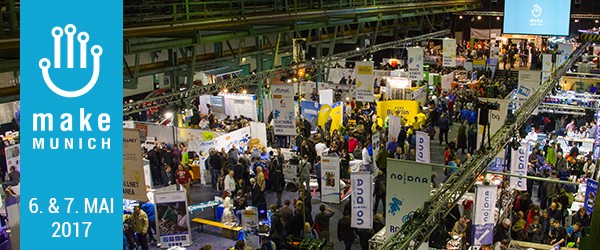
München, den 27.3. 2017. Die Make Munich ist Süddeutschlands größtes Maker- und Do It Yourself Festival, das im kommenden Mai bereits zum vierten mal in München stattfindet und sich inzwischen fest in München etabliert hat.
Am 6./7. Mai 2017 präsentieren dort die Maker ihre Erfindungen, Projekte, Technologien und die neue, inklusive und wissensteilende Maker-Innovationskultur.
An den Messeständen und in vielen inspirierenden Vorträgen wird die Maker-Bewegung in ihrer ganzen Bandbreite erlebbar sein. Aber nur „schauen“ und „zuhören“ ist nicht genug, denn es geht um’s „selber-machen“ und ausprobieren: In zahlreichen Mitmach-Workshops, werden „Nachwuchs-Makern“ alle Fertigkeiten vermittelt, um selbst kreativ und erfinderisch tätig zu werden.
Neben 150 Ausstellern werden mehr als 10.000 technikaffine, umweltbewusste, kreative und innovationsbegeisterte Besucher und Maker aus Deutschland sowie den angrenzenden Ländern Italien, Schweiz und Österreich erwartet.
Zu den Themenklassikern der Makerbewegung wie Elektronik & Internet of Things (IoT), 3D Druck, digitale Tools, Robotik, Maker-Startups und der FabLab/Makerspace Communityarea erwarten sie auf der Make Munich 2017 viele neue Themenbereiche wie Bio-Hacking & Food Maker, Maker & Design, Fashion/Wearables-Technology und Green Maker. In der neuen Quadcopter-Area kann man sich selbst als Drohnen-Pilot versuchen und in der neuen Virtual Reality (VR) + Augmented Reality (AR) Area in virtuelle Welten abtauchen.
Maker sind die kreativen Pioniere, die digitale Werkzeuge wie 3D-Drucker, Lasercutter, Microcontroller u.v.a. nutzen, um innovative Dinge zu erfinden, entwickeln und produzieren. So bleibt Produktion und Produktinnovation nicht mehr nur Unternehmen vorbehalten – das Maker-Movement steht damit für einen Demokratisierungsprozess der Produktion und diese offene, auf Teilen und Gemeinschaft ausgelegte Innovationskultur der Maker, hat das Potential unsere Gesellschaft und Wirtschaft – ähnlich wie es das Internet in den letzten 25 Jahren bereits getan hat – radikal zu verändern. Auf der Make Munich 2017 wird dies sichtbar und unmittelbar erlebbar werden.
Als Festival „von Makern für Maker“ wird die Organisation der Make Munich zum erheblichen Teil aus der Münchener Maker-Community heraus getragen.
Seit 2015 gibt jedoch die neu gegründete Make Germany GmbH der Make Munich als Veranstalter ihren festen geschäftlichen und organisatorischen Rahmen. Die Make Germany GmbH ist ein Social Enterprise, das sich die Förderung und Vernetzung der Maker-Szene auf die Fahnen geschrieben hat.
Make Munich Kurzinfo:
Was: Süddeutschlands größtes Maker- und Do It Yourself Festival
Wann: Sa/So 6.+7. Mai 2017
Offen: 10-18 Uhr
Wo: Zenithhalle, Lilienthallee 29, 80939 München
Eintrittspreise: Kinder bis 12J. kostenlos, Jugendliche 6,-, Erwachsene 15,-, Familien 29,-
http://www.make-munich.de/tickets/

International MOONBOTS Competition Launches, Challenging Next Generation of Space Explorers
LOS ANGELES–(BUSINESS WIRE)–Today, Google Lunar XPRIZE announced the final MOONBOTS Challenge, an international competition that inspires the next generation of space explorers and innovators and is also known as the “Google Lunar XPRIZE for Kids.” The MOONBOTS Challenge, which invites kids ages 8 to 17 to create a video of what they would leave behind on the Moon as a legacy and design and program their own lunar rover, will for the first time provide an opportunity for finalists to send personalized video messages to the Moon, as part of the Google Lunar XPRIZE teams’ missions.
The MOONBOTS Challenge is inspired by the $30M Google Lunar XPRIZE, a global incentivized competition that was launched to challenge and inspire engineers and entrepreneurs from around the world to develop low-cost methods of robotic space exploration and ignite a new era of space exploration. The Google Lunar XPRIZE is in its final phase with five privately funded teams preparing to initiate their launch to the Moon by December 31, 2017. The sixth and final MOONBOTS Challenge will also provide an opportunity for one grand prize winner to go on a once-in-a-lifetime trip to meet with a finalist Google Lunar XPRIZE team.
“As we embark on the final leg of the MOONBOTS Challenge, the next generation of space travelers will get an opportunity to tell us what is most important to them, and actually leave that legacy behind on the Moon,” said Chanda Gonzales-Mowrer, senior director, Google Lunar XPRIZE. “We really want to get kids excited about space exploration and the associated STEM disciplines, and we welcome newcomers from all countries and communities to join the competition and help inspire kids all over the world.”
In order to enter the competition, teams, comprised of two to four members and one team captain that is 18+ years old, are asked to submit a two-minute video about what they would leave behind on the Moon as a legacy. Registration for the MOONBOTS Challenge is officially open through March 15, 2017 and there is no charge to enter.
A panel of judges from the International Space University will select 12 teams by April 2017 to qualify and those teams will be provided one of three robotics platforms (LEGO® MINDSTORMS® EV3, VEX IQ, MECCANO™ Meccanoid 2.0) to build and program a unique simulated robotic mission, based on the legacy in the video they submitted. Additionally, they are asked to provide a demonstration to the judges via live webcast and contribute to STEM (Science, Technology, Engineering and Math) education by sharing their innovation with children and adults in their community. The announcement of the grand prize winner will be made in July 2017.
Since 2010, MOONBOTS has had hundreds of teams sign-up and has challenged thousands of young people from all around the world. In addition to the Google Lunar XPRIZE, competition partners include FIRST® LEGO® League, VEX Robotics Inc., LEGO Education, Parentesis.com, MECCANO™, GeekDad, GeekMom, Robomatter, Inc. and Dexter Industries.
More information about the competition can be found at moonbots.org.
About the Google Lunar XPRIZE
The $30M Google Lunar XPRIZE is an unprecedented competition to challenge and inspire engineers and entrepreneurs from around the world to develop low-cost methods of robotic space exploration. To win the Google Lunar XPRIZE, a privately funded team must successfully place a robot on the Moon’s surface that explores at least 500 meters and transmits high-definition video and images back to Earth. Visit http://lunar.xprize.org/ or @GLXP for more information.
About XPRIZE
XPRIZE, a 501(c)(3) nonprofit, is the global leader in designing and implementing innovative competition models to solve the world’s grandest challenges. Active competitions include the $30M Google Lunar XPRIZE, the $20M NRG COSIA Carbon XPRIZE, the $15M Global Learning XPRIZE, the $10M Qualcomm Tricorder XPRIZE, the $7M Shell Ocean Discovery XPRIZE, the $7M Barbara Bush Foundation Adult Literacy XPRIZE, the $5M IBM Watson AI XPRIZE, the $1.75M Water Abundance XPRIZE and the $1M Anu & Naveen Jain Women’s Safety XPRIZE. For more information, visit http://www.xprize.org/.
